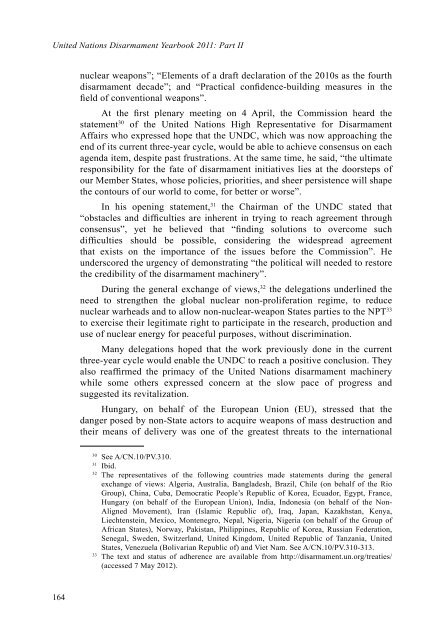DYB2011-Part-II-web
DYB2011-Part-II-web
DYB2011-Part-II-web
You also want an ePaper? Increase the reach of your titles
YUMPU automatically turns print PDFs into web optimized ePapers that Google loves.
United Nations Disarmament Yearbook 2011: <strong>Part</strong> <strong>II</strong><br />
164<br />
nuclear weapons”; “Elements of a draft declaration of the 2010s as the fourth<br />
disarmament decade”; and “Practical confidence-building measures in the<br />
field of conventional weapons”.<br />
At the first plenary meeting on 4 April, the Commission heard the<br />
statement30 of the United Nations High Representative for Disarmament<br />
Affairs who expressed hope that the UNDC, which was now approaching the<br />
end of its current three-year cycle, would be able to achieve consensus on each<br />
agenda item, despite past frustrations. At the same time, he said, “the ultimate<br />
responsibility for the fate of disarmament initiatives lies at the doorsteps of<br />
our Member States, whose policies, priorities, and sheer persistence will shape<br />
the contours of our world to come, for better or worse”.<br />
In his opening statement, 31 the Chairman of the UNDC stated that<br />
“obstacles and difficulties are inherent in trying to reach agreement through<br />
consensus”, yet he believed that “finding solutions to overcome such<br />
difficulties should be possible, considering the widespread agreement<br />
that exists on the importance of the issues before the Commission”. He<br />
underscored the urgency of demonstrating “the political will needed to restore<br />
the credibility of the disarmament machinery”.<br />
During the general exchange of views, 32 the delegations underlined the<br />
need to strengthen the global nuclear non-proliferation regime, to reduce<br />
nuclear warheads and to allow non-nuclear-weapon States parties to the NPT33 to exercise their legitimate right to participate in the research, production and<br />
use of nuclear energy for peaceful purposes, without discrimination.<br />
Many delegations hoped that the work previously done in the current<br />
three-year cycle would enable the UNDC to reach a positive conclusion. They<br />
also reaffirmed the primacy of the United Nations disarmament machinery<br />
while some others expressed concern at the slow pace of progress and<br />
suggested its revitalization.<br />
Hungary, on behalf of the European Union (EU), stressed that the<br />
danger posed by non-State actors to acquire weapons of mass destruction and<br />
their means of delivery was one of the greatest threats to the international<br />
30 See A/CN.10/PV.310.<br />
31 Ibid.<br />
32 The representatives of the following countries made statements during the general<br />
exchange of views: Algeria, Australia, Bangladesh, Brazil, Chile (on behalf of the Rio<br />
Group), China, Cuba, Democratic People’s Republic of Korea, Ecuador, Egypt, France,<br />
Hungary (on behalf of the European Union), India, Indonesia (on behalf of the Non-<br />
Aligned Movement), Iran (Islamic Republic of), Iraq, Japan, Kazakhstan, Kenya,<br />
Liechtenstein, Mexico, Montenegro, Nepal, Nigeria, Nigeria (on behalf of the Group of<br />
African States), Norway, Pakistan, Philippines, Republic of Korea, Russian Federation,<br />
Senegal, Sweden, Switzerland, United Kingdom, United Republic of Tanzania, United<br />
States, Venezuela (Bolivarian Republic of) and Viet Nam. See A/CN.10/PV.310-313.<br />
33 The text and status of adherence are available from http://disarmament.un.org/treaties/<br />
(accessed 7 May 2012).


